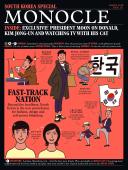
Issue 111
South Korea special. Exclusive: President Moon on Donald, Kim Jong-un and watching TV with his cat.
In This Issue
Oops! No content was found.
Looks like we no longer have content for the page you're on. Perhaps try a search?
Return Home
Daily inbox intelligence from Monocle

South Korea special. Exclusive: President Moon on Donald, Kim Jong-un and watching TV with his cat.
Looks like we no longer have content for the page you're on. Perhaps try a search?
Return Home